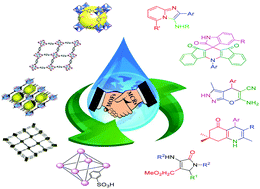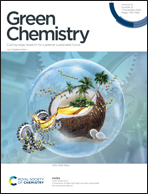Metal–organic frameworks: advanced tools for multicomponent reactions
Abstract
The increasing demand for simple, clean, and sustainable protocols for the preparation of complex organic molecules has continuously encouraged researchers to discover and design modern methodologies. Metal-catalyzed multicomponent reactions (MCRs) are versatile synthetic protocols frequently utilized in the preparation of numerous natural products and pharmaceuticals, offering perfect molecular diversity and high level of atom efficiency with energy saving in a single reaction step. Although most of the investigated metal-catalyzed MCRs are based on transition metal catalysts such as palladium and copper, the exploration of new sustainable catalytic systems is constantly the subject of intense research. In this regard, metal–organic frameworks (MOFs) have recently drawn significant interest as environmentally benign alternatives, providing abundant catalytic sites in highly ordered crystalline skeletons. Although this field of research is still in its infancy, MOFs have clearly exhibited their efficacy in multicomponent reactions. This review aims to outline the developments of MOFs for benign applications in multicomponent reactions.



 Please wait while we load your content...
Please wait while we load your content...